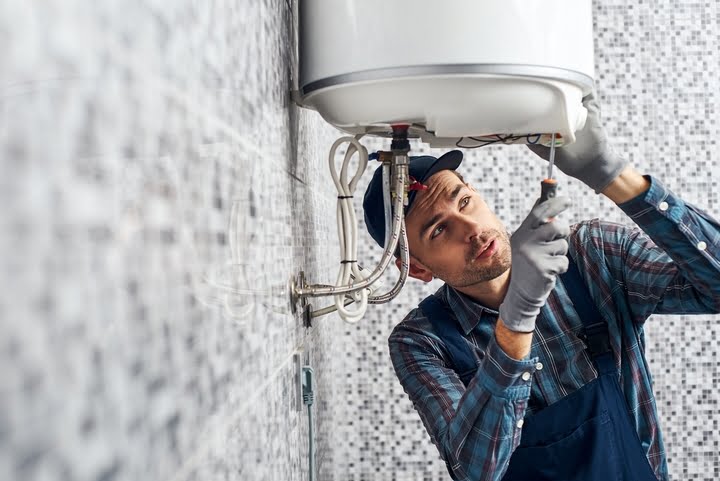Essential Actions for Home Owners Managing Malfunctioning Heating Units
Essential Actions for Home Owners Managing Malfunctioning Heating Units
Blog Article
We've encountered the article involving Water Heater Repair down the page on the net and figured it made perfect sense to talk about it with you in this article.

Whether it is located in the cellar or a separate room, damaged hot water heater can trigger stress and anxiety. A common unit holds 80 gallons, so an overnight leak will cause a flood. This causes significant property damage with drenched walls and also floorings. Besides, having no warm water supply is also troublesome. If you are dealing with these problems, take note of the following:
Call the Plumber
After doing the first two security actions, you should call your plumber to come right away to repair a ruptured water heating unit. There are typically indicators that your aging water heating unit has debris accumulation in the inside.
Instead, as quickly as you identify these signs, have actually an expert come to evaluate your water heating unit storage tank. Typically, water heating units have a lifespan of regarding 8 to 12 years.
Cut Off the Cold Water Supply
Cut off the containers tap water supply from the source. This goes from your main water line right into the storage tank. When your tank is in good condition, the cold water stops filling out when the container is complete. Considering that it is dripping, the water will certainly proceed to move. Shut the shutoff located at the top of the heating system. Turn this clockwise to close it off. If you can not discover it or reach it, you must turn off that main supply of water line outside your residential property.
Turn Off Power Source
Prior to calling the plumber, shut off a gas water heater by transforming the temperature dial. This is generally located on top of the thermostat. Switch over off the circuit breaker if you have a model that runs on electric power. This will certainly avoid electrocution, particularly if there is a leakage as water is a conductor. Generally, the burner shuts down when the water strikes a certain temperature level. With a damaged tank, it might malfunction. Cutting it off guarantees you remain safe.
Clean Up Home
After calling the plumber, file damages by remembering and images so you can declare your homeowner's insurance policy. From there, start the prompt clean-up. Take out any kind of important belongings to prevent additional saturating. Then, get rid of any standing water to avoid mold as well as mold growth. Use that to drain the water if you have a completely submersible water pump. Or else, the conventional pail method will also work. Attempt to mop out whatever, consisting of walls as well as wall surfaces. Maintain them running to maintain air distributing if you have an electric fan and dehumidifier. This will help prevent mold development.
Keep in mind, if you observe any kind of issues with your water heater, call the pros immediately. You can not take this problem gently since a defective thermostat can increase water temperature to a hazardously high degree, leading to unexpected burns. A broken heater pressure safety valve can also trigger a surge. For finest outcomes, obtain a yearly check so your unit gets inspected, cleaned, drained, and replenished, guaranteeing ideal efficiency.
After doing the initial 2 safety and security actions, you must call your plumber to come right away to fix a ruptured water heater. Rather, as soon as you spot these signs, have an expert come to examine your water heating unit storage tank. Before calling the plumber, closed off a gas water heating unit by transforming the temperature level dial. If you have a submersible water pump, use that to drain pipes the water. Bear in mind, if you observe any type of problems with your water heating system, call the pros right away.
When You Should Turn off Your Water Heater
When the main water supply is shut off
There are many circumstances in which the main water supply is turned off. When this happens, many homeowners wonder if it’s safe to keep the water heater on of it should be shut down too.
In most cases, it may not be necessary to turn off the water heater, but it also won’t hurt, either. However, there are two reasons when you should turn off the unit to prevent too much pressure or heat from building up inside the tank:
When there’s a leak
If your water heater springs a leak due for a variety of reasons, including age or a valve malfunction, you should always turn off the unit and shut off the water supply until the issue is resolved.
https://www.libertyplumbingheatingandair.com/blog/when-you-should-turn-off-your-water-heater/

Hopefully you enjoyed our excerpt on Water Heater Burst. Thanks so much for taking the time to read through our piece of content. Appreciated our blog entry? Please share it. Help someone else check it out. I cherish reading our article about How to Avoid a Broken Hot Water Heater.
Plumbing woes? Connect. Report this page